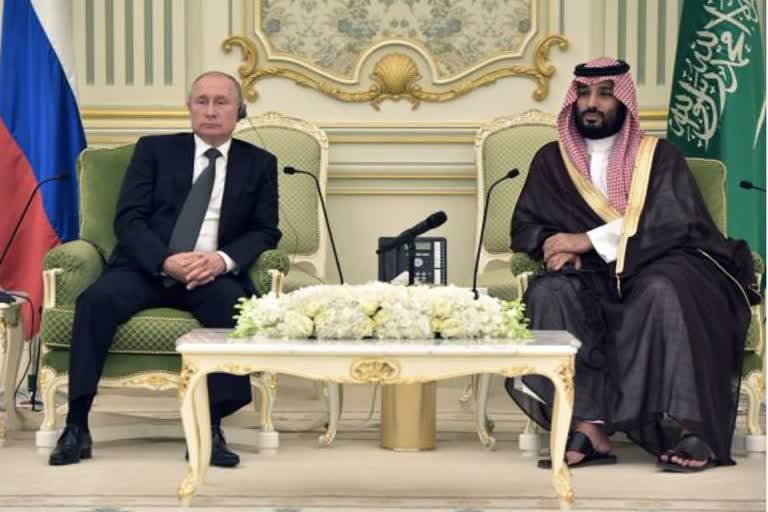New Delhi: For an energy consuming world oil prices and flows matter. Countries that possess and export hydro carbons like oil have long been able to manipulate prices by reducing or increasing their production and export. As a consequence these countries influence world economy and the geopolitics around this.
To regulate the oil market the Organization of Oil Producing Countries (OPEC) with 15 member countries was set up in the 1980’s. Russia is not part of this bloc but does attend their meetings in what is known as OPEC+.
OPEC has functioned as a mutually backslapping monopoly club. Russia and the US which is now a leading producer of shale gas are independent players with great capacity also to manipulate oil prices.
In early March parallel to the Coronavirus outbreak, oil prices fell as demand decreased especially as China, South Korea and others decreased oil imports substantially. Saudi Arabia proposed cuts in oil production in order to curb falling prices of crude which was selling at $50 a barrel. President Putin refused to accept this production cut and continued high level output.
The Russian ‘nyet’-no, sent the oil price to spiral down to the lowest ever since the 1991 Gulf War.
Saudi Arabia who see themselves as the world’s major oil major decided on an eyeball to eyeball confrontation with Putin. Not only did they cut crude prices but also increased output of Saudi oil.
This led to a further downward price spiral hovering around $ 30 a barrel. Goldman Sachs predict that these could go down to $20 a barrel.
So who are the losers and who are the winners? Why did Russia that is so dependent on profits from oil take such a risk?
Several reasons account for Putin’s oil game of cards. One, Russia has built huge monetary and gold reserves and tightened its budget since the 2015 oil shock and recession. The economic sanctions against Russia by the West on the issue of conflict with Ukraine have led Russia to plan its economy as an ‘almost’ ready state of war.
Read more:ATF price cut by 12%; freeze on petrol, diesel price continues
So the fall in oil prices is not going to hit them as perceived. In fact they are hitting the Arabs and others in OPEC. Despite what the Russians say about their good relations with the Saudis and their collaboration on oil prices the last three years, the Russians are miffed at the way the Saudis have opposed Russian military support to the Assad regime in Syria and Russian policies in West Asia. So Russia has been able to show the Saudis their geopolitical place by hurting them.
Second, the US as a leading oil producer, exporter and oil guzzler, on account of shale gas rise has been challenging the Russian and Saudi market domination and also leveraging its oil profits and pricing by cornering key markets. But in this oil price war the US too has been forced to cut both prices and production. This has led to a crash in US oil stocks, sacking of shale companies’ workers. President Trump is worried for the US oil companies.
This gives Putin an upper hand as President Trump will at some point be forced to negotiate with Russia. Putin has now the ability to arm twist the US and has sidelined OPEC in one go. It has been able to take a side swipe on the US for squeezing Russia with sanctions, which increased last month when the US placed sanctions on Russia’s oil major Rosneft since they sold oil for Venezuela which is also under US sanctions.
Third the Russian have fairly secure markets for their oil like the Chinese and even Europe. So Putin has done a finesse- as they say in a game of Bridge. But what about the ordinary consumers?
It would appear that consumers are set to gain in a so called ‘free market fall’ where they should see cheaper gas prices. But this is where the big oil companies come in. In the US and other OPEC countries, the oil companies are putting pressure on their governments as their profits fall.
So they are demanding tariffs against the cheap supplies from Russia and Saudi Arabia or big subsidies and tax cuts for local oil companies and refineries. In India for example, despite the fall in global crude, the Indian government has increased excise duties so the consumer has not been able to get cheaper petrol, even as the government has gained.
As anxiety over inflation and oil crises has been overtaken by anxiety over the Corona virus, it is likely that like big pharma, big oil will also prevail. So will the big state unless people understand who the gainers and losers are and act collectively in their own interest.
(Atricle by Anuradha Chenoy. She is a retired professor and former dean, School of International Studies, JNU. Views expressed above are personal.)



